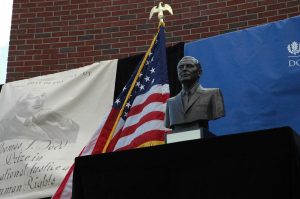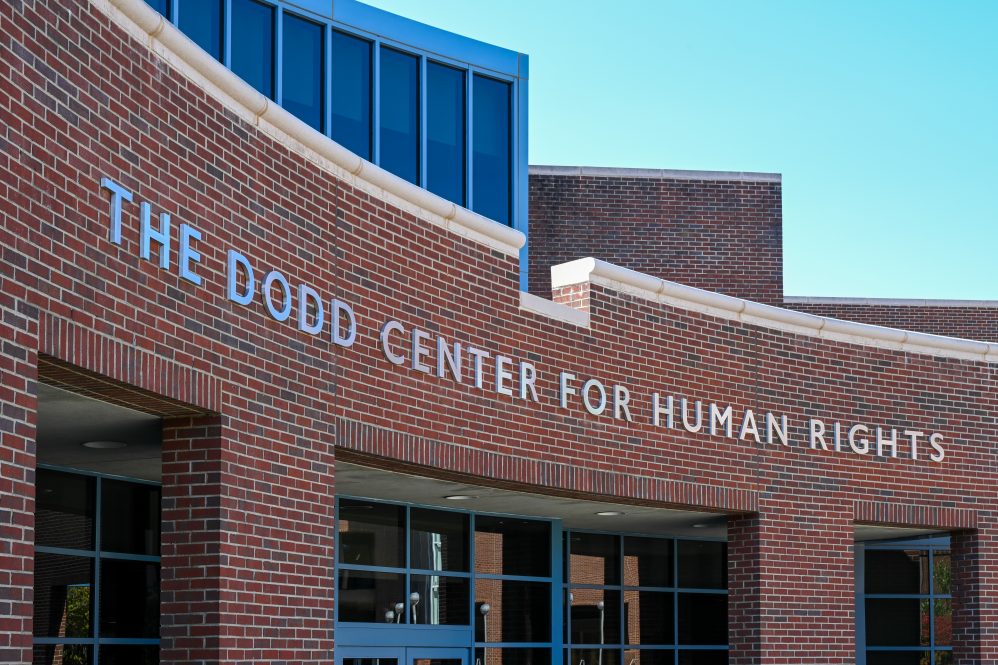In any given day, the average person takes about 20,000 breaths.
As long as we’re not being choked, we usually don’t even think about those breaths, says James Waller, the director of Dodd Human Rights Impact and the inaugural Christopher J. Dodd Chair in Human Rights Practice at UConn.
But if we are being choked, those breaths come into a critical focus.
“For me, that’s what human rights are about – when people are losing them, that’s when you think about them,” says Waller. “What I want to challenge people to think about is: Let’s be more cognizant of what those rights are. Let’s not wait to lose them before we start to think about what they are and why they’re so important.”
Beginning on October 25, the UConn community and leaders, activists, academics, artists, policymakers, and students from across the country and around the world will come together in Storrs to place critical focus on human rights at the inaugural Human Rights Summit at The Dodd Center.
Entitled “Human Rights and the Global Assault on Democracy,” the Dodd Summit will examine the key human rights challenges of our time and generate new ideas to promote social justice and human dignity globally.
Amidst ongoing war in Ukraine; heightened violence in Israel, Gaza, and the region; renewed conflict in Sudan; a rise in authoritarianism globally; and political division here at home, the Dodd Summit could not be timelier.
“Our most recent data tells us that over 50% of people in the world live in a country that’s an autocratic or authoritarian regime, and in those types of countries, there’s very little regard for minority rights,” says Waller. “In those situations, it’s the most vulnerable people who are the ones most subject to abuse.”
A Focus on Ukraine
The summit kicks off on October 25 with the presentation of the Thomas J. Dodd Prize in International Justice and Human Rights to the Babyn Yar Holocaust Memorial Center in Kyiv, Ukraine, which aims to serve as a physical place of memory, a museum, an educational archive, and a site of scientific knowledge about the atrocities committed at Babyn Yar and their modern-day impact.

Between 70,000 and 100,000 people – including almost the entire Jewish population of Kyiv – were killed at Babyn Yar, a ravine in the Ukrainian capital city and the site of documented Nazi massacres during the Holocaust.
The Thomas J. Dodd Prize in International Justice and Human Rights commemorates the distinguished career in public service of Thomas J. Dodd, who served as Executive Trial Counsel at the Nuremberg Trials, as U.S. Representative from 1953 to 1957, and as Connecticut Senator from 1959 to 1971.
Dodd continually fought against infringement and suppression of human rights in the United States and abroad during his long public career, and the collection of his papers and letters from his time prosecuting Nazi war crimes at Nuremberg are currently housed at The Dodd Center for Human Rights at UConn.
Senator Christopher J. Dodd, Thomas Dodd’s son and a human rights leader in his own career, believes that, “our humanity, in many ways, is defined by how we treat the most vulnerable, and not just elsewhere, but close to home,” and he is looking forward to joining the diverse community gathered at this summit to address and discuss the factors contributing to the global assault on democracy.
“For me, this event has a special meaning,” says Natan Sharansky, the Ukranian activist and chair of the supervisory board for the Babyn Yar Holocaust Memorial Center who served nine years in a Soviet gulag before his release in 1986. He later served in four successive Israeli governments, as minister and as deputy prime minister, and was a recipient of the U.S. Congressional Gold Medal in 1986 and the U.S. Presidential Medal of Freedom in 2006.
“In 1975, as a young activist in the struggle for Soviet Jews and human rights in the Soviet Union, I met in Moscow with a group of young congressmen who were visiting the Soviet Union,” Sharansky says. “Among them were Christopher Dodd and Liz Holtzman. For us, activists, the very fact of meeting with American legislators was a great deal and a proof of support. It is not surprising that all these meetings would be later classified in my sentence as high treason.
“During the years of my human rights activism, I was detained frequently. Once it was because of my attempt to travel to Kyiv to mark the anniversary of the Babin Yar massacre. Why? Babyn Yar is not only the symbol of the Holocaust by bullets, and the biggest mass grave of the Holocaust. It is also the symbol of the Soviet regime’s attempts to erase spiritually and physically the memory of the Holocaust.”
For Daniel Weiner, UConn’s Vice President for Global Affairs and a professor of geography, the awarding of the Dodd Prize to the Babyn Yar Holocaust Memorial Center is particularly relevant in connecting the past to the present.
“Recognizing Babyn Yar,” Weiner says, “is a reminder of the dangers of fascism and autocracy that go unchecked. And for many people in the world today, the struggle against those types of abusive regimes is more than history – it is lived experience.”
The event also holds special meaning for Andrea Peto, a professor at the Central European University Vienna and editor in chief of the journal Eastern European Holocaust Studies.
“The Dodd Prize to the Babyn Yar Holocaust Memorial Center demonstrates that its scholarly journal, the East European Holocaust Studies, the members of the editorial and advisory board, together with the publisher, the Gruyter, and dozens of its authors who published their work with us open access, addressed a major gap in researching the Holocaust in Eastern Europe,” Peto says. “I hope the visibility that the Dodd Prize will give to our work will encourage more young researchers to stay in academia in Ukraine and beyond and engage in pathbreaking research.”
The Dodd Prize ceremony will take place at the Jorgensen Center for the Performing Arts in Storrs.
The focus on Ukraine continues on Thursday, October 26, with a keynote address at The Dodd Center’s Konover Auditorium from Oleksandra Matviichuk, a Ukrainian human rights lawyer and civil society leader based in Kyiv.
Matviichuk leads the nonprofit Centre for Civil Liberties and is an advocate for democratic reforms. The Center for Civil Liberties was jointly awarded the 2022 Nobel Peace Prize, the first Nobel Prize in history awarded to a Ukrainian citizen or organization.
The address will be followed by a panel discussion on the legacy of Babyn Yar, featuring representatives from the Holocaust Memorial Center – including its CEO, Oleksiy Makukhin – and Rabbi Philip Lazowski, a Holocaust survivor and rabbi emeritus at Emanuel Synagogue in West Hartford.
Thursday will also mark the opening of the Russian War Crimes exhibit, a gripping and graphic visual display of still images and documentary video depicting war crimes perpetrated by Russia since its invasion of February 2022. The display – which organizers caution may be disturbing and difficult for some viewers – was first exhibited in Davos in 2022 and will be open at The Dodd Center in Room 162 for the duration of the summit.
A Focus on Democracy – Abroad and At Home
On Thursday afternoon, the summit will first look at Russian atrocities in Ukraine before shifting to a broader view of the assault on democracy across the globe. Experts from the United Nations, India, Jordan, the United States and Latin America will weigh in on the challenges to democracy and explore ways in which the promotion and protection of human rights can respond to those challenges.
On Friday, October 27, human rights come home to the United States, where polling suggests that a majority of Americans believe our democracy is in crisis and at risk of failing.
A panel discussion will unpack the challenges to democracy in the United States and strategies to help support it. Panelists will include Nicole Safar, reproductive freedom advocate and executive director of Law Forward in Wisconsin; Jamil Dakwar, director of the ACLU’s Human Rights Program; and Harry Dunn, police office and author of Standing My Ground: A Capitol Police Officer’s Fight for Accountability and Good Trouble After January 6th.
The day will continue with a discussion featuring Carol Anderson, the Charles Howard Candler Professor of African American Studies at Emory University, and Ejim Dike, a senior fellow at the Western States Center and the former executive director of the U.S. Human Rights Network, led by Connecticut Senator Christopher J. Dodd.
The day concludes with a Democracy and Dialogue session for UConn students – developed in collaboration with UConn’s Undergraduate Student Government, representatives of the Human Rights and Action Learning Community, and Dodd Impact’s Democracy and Dialogues Initiative – centered on voting and voter participation at the local, state, and national level.
The shifting focus of the summit was intentional, organizers say, as they hope to engage and empower the next generation of human rights leaders at UConn to critically focus on what will be an expansive discussion over the course of the program.
 “The way we planned this summit, it starts very broad with the global assault on democracy,” says Waller, “but by the final day of the summit, it narrows down to what it means for us here at home – very close to home – in the U.S., and what it means for us here on campus.
“The way we planned this summit, it starts very broad with the global assault on democracy,” says Waller, “but by the final day of the summit, it narrows down to what it means for us here at home – very close to home – in the U.S., and what it means for us here on campus.
“Democracy is not self-sustaining. It’s not automatic,” he continues. “It has to be sustained with effort and will. If we can get a lot of students in who get that message and start to recommit to that, to me that would be our big success.”
For more information about the Human Rights Summit at The Dodd Center, to register to attend, and to view the detailed schedule of events, please visit summit.humanrights.uconn.edu.



